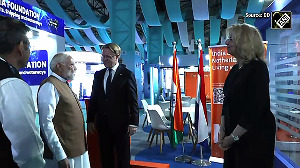The United States is pushing for an Asian moratorium on nuclear weapons production in view of the 'relationship between India, Pakistan and others' and has asked New Delhi to be 'helpful' on that, Secretary of State Condoleezza Rice has said.
"We are trying to get the work done on the Fissile Material Cutoff Treaty. We have told the Indians they need to be helpful in that. They have promised that they will," Rice said on Wednesday at the Senate Foreign Relations committee hearing on the Indo-US nuclear agreement.
"And we will press them very hard to help us They should know that it is one of the determinations that the President will have to make. So we have that leverage," she said, responding to a question from Presidential candidate in 2004 Senator John Kerry.
N-deal won't fuel arms race: Rice
"We would obviously like to see, in the relationship between India, Pakistan and others, a regional moratorium on fissile material production. We have made it very clear that we would encourage that; that we would encourage India and Pakistan to look at their nuclear relationship and the way that in some of the earlier days people were concerned about safety and security between the US and Soviet arsenals. So there are a lot of things that we could do," Rice said.
"On the broader proliferation regime, I agree with you, Senator. One of the reasons I think that Mohamed ElBaradei has been in favour of this is that there is much that India can do as a big state with nuclear technology to enhance our ability to, for instance, criminalise the behaviour of those who trade in nuclear technologies," she said.
Complete Coverage: Indo-US Nuclear Tango
"Also, by adhering to these various regimes the missile technology control regime, the NSG guidelines they can help us to expand the concept of what is the nuclear proliferation regime, because the NPT is an important part of it. But we clearly need more than the NPT. And I want to emphasise again that on the Proliferation Security Initiative, we will press very hard," the Secretary of State said.
Kerry said he had broached this idea with President Pervez Musharraf and the Pakistan prime minister and that there seemed to be a 'spark' of interest.
"Maybe they were being kind, but there seemed to be a genuine spark of interest in the notion of trying to arrive at some agreement regionally on the numbers of nuclear weapons. It is hard to understand why they would need to continue to build at levels beyond an adequate deterrent between each other and China. Did you explore that," Senator Kerry asked Rice.
In response to Kerry's query, Rice said, "What we could not achieve - and I think it was unlikely - was a constraint unilaterally by any one state. But the idea that has been pursued in some second-track arrangements and discussions, and discussions between the parties, not just about absolute levels but also safety, security and confidence-building measures, I think is something we are very interested in and we had like to pursue. We now have the kind of relationship with the two that might make it worthwhile."
Complete Coverage: President Bush in India
"I cannot say that it is going to have an immediate payoff. These things are hard," the Secretary of State added.
Senator Kerry, in the same line of questioning and debate, posed the question as to how Washington would react if China pressed for a similar exception for Pakistan; and that if this could be the 'show stopper.'
"We have been very clear publicly and privately with China and Pakistan, that Islamabad is not an appropriate state for this kind of an exception. It is just a different history," responded Rice, stressing that Beijing cannot make this a price for the approval of the India deal.
Will Condi Rice swing the N-deal?
On whether this could be a show stopper, Rice responded, "I do not believe so. Nothing that we have had discussions with, suggests that. And Pakistan itself understands its own special history."





